Reply To:
Name - Reply Comment
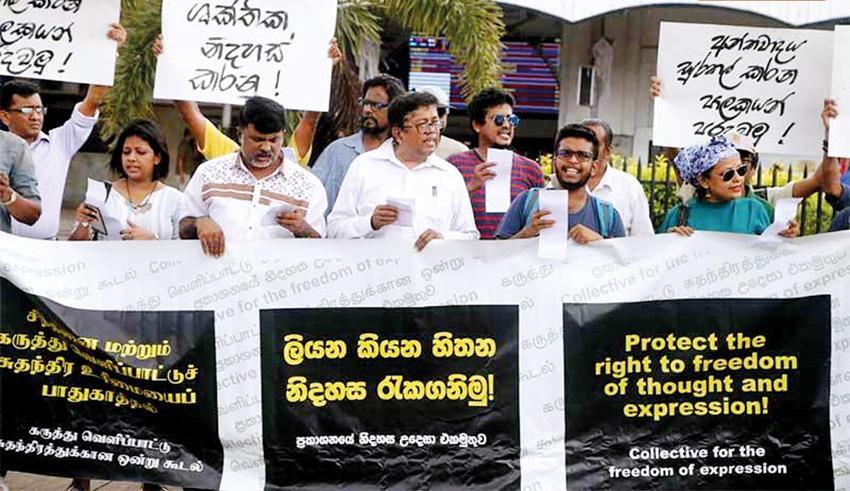
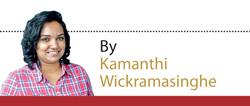 Media and the Government often don’t see eye to eye and this is applicable to most countries, be it democratic or not. Sri Lankan media platforms too have faced much censorship while many journalists also fell prey to draconian laws of yesteryear. With the advent of social media platforms, the global media landscape has drastically changed in the face of ‘New Media’ and Governments are now more focused on controlling what comes as ‘critical’ content to protect their image. Last week, Media Minister Keheliya Rambukwella announced that a registration fee would be introduced on websites that carry news and are active on social media. A suggestion was also made in reference to a new law passed in Singapore to control matters pertaining to social media and websites and that a new mechanism should be formulated after studying such laws.
Media and the Government often don’t see eye to eye and this is applicable to most countries, be it democratic or not. Sri Lankan media platforms too have faced much censorship while many journalists also fell prey to draconian laws of yesteryear. With the advent of social media platforms, the global media landscape has drastically changed in the face of ‘New Media’ and Governments are now more focused on controlling what comes as ‘critical’ content to protect their image. Last week, Media Minister Keheliya Rambukwella announced that a registration fee would be introduced on websites that carry news and are active on social media. A suggestion was also made in reference to a new law passed in Singapore to control matters pertaining to social media and websites and that a new mechanism should be formulated after studying such laws.
Singapore’s Protection from Online Falsehoods and Manipulation Act
The Protection from Online Falsehoods and Manipulation Act (POFMA) or the ‘Fake News Law’ that was passed in Singapore, has been designed to allow authorities to curtail fake news or false information through a graduated process of enforcing links to fact-checking statements, censorship of website or assets on social media platforms and criminal charges. According to the law, online media platforms are required to carry corrections or remove content the government considers to be false, with penalties for perpetrators including jail terms of up to 10 years along with fines. This has come under heavy scrutiny as rights groups and journalists believe that it’s a threat to freedom of speech and expression. However, the Government of Singapore has reiterated that it will only monitor ‘falsehoods’ in the form of bots, trolls and fake accounts and that it will have no impact on the exchange of free speech. Singapore is ranked 158 out of 180 countries – below Russia and Myanmar in the World Press Freedom Index of Reporters Without Borders, a non-government group that promotes freedom of information while Sri Lanka is ranked 127.
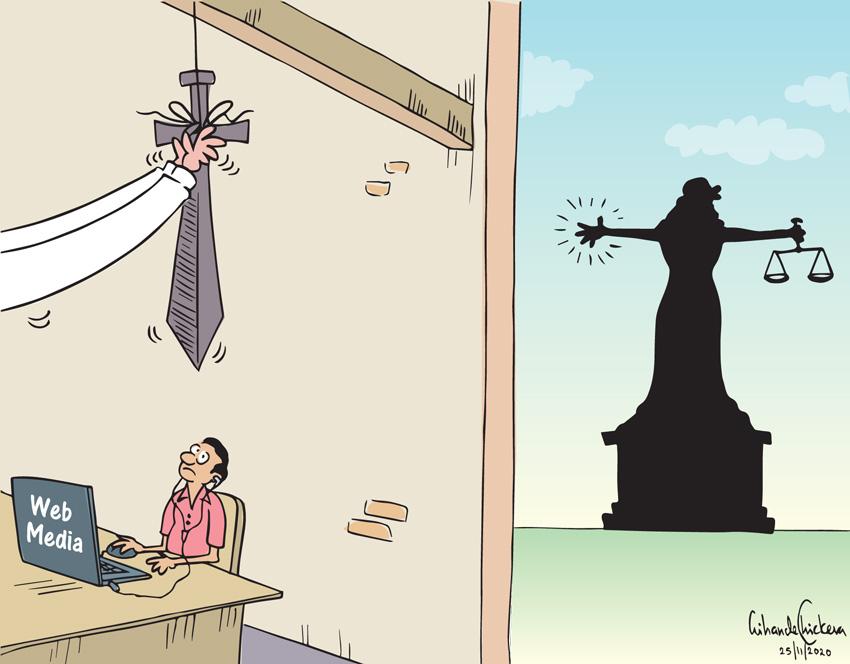
Social media destroying personalities
“Social media is destroying personalities and the participants at the meeting proposed that news websites and social media institutions should be registered,” Media Minister Keheliya Rambukwella said. “This was introduced back in 2012 as well. This way, they will be responsible for whatever they post on social media. Therefore users will not be anonymous once they are registered and we will start the registration process within the next two weeks,” added Rambukwella.
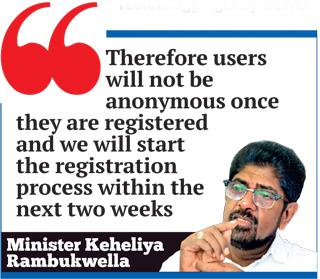
He further said that the Press Council Act should get more teeth. “As of now if you report a news item with an error, they would carry a correction in a less prominent space. There were discussions on how electronic media could also be included into the Act,” the minister said. When asked if they would follow the law passed in Singapore he said that the suggestion was in the minutes and added that the registrations will be handled by Information and Communication Technology Agency (ICTA).
Self-regulation, a better approach
“One cannot regulate social media because you can always bypass the laws and make a new application,” said Chanakya Jayadeva, attorney-at-law and legal counsel specialising in various avenues including ICT and media. “The best thing therefore in the Internet of things is self-regulation. Broad-based and overall Regulation of social media will collide with Article 14 (1) of the Constitution, that guarantees an individual’s right to freedom of opinion, expression and publication and therefore would be unconstitutional as well as unhealthy for democratic governance. Also, when people are not allowed to express, it bottles up and festers within individuals and bursts in other ways leading even to things like revolutions etc. History has shown us that,” said Jayadeva.
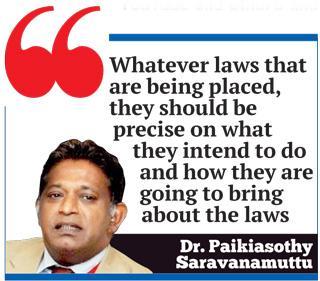
“But on the other hand in certain limited areas only, some sort of regulation would be necessary. Hate speech is one such area that should not be given a platform on social media or any media. In Sri Lanka the International Covenant on Civil and Political Rights (ICCPR) Act no 56 of 2007 is a law where it makes advocating or propagating of hate speech a crime. The Acts section defines 3 . (1) No person shall propagate war or advocate national, racial or religious hatred that constitutes incitement to discrimination, hostility or violence. In this as advocacy is not defined, but according to SL Human Rights Commission Report, the form of advocacy that constitute incitement is based on the test of ; context, speaker, intent content and form, extent of advocacy and imminent harm (test developed under Rabat Plan of Action of UN).This law applies across the board which means it extends to even social media and the internet. Therefore, since the law is already in place, if somebody wants to regulate hate speech on social media and the internet what is advisable is to make regulations on hate speech based on this section to make it specifically applicable to social media and the internet,” he added.
He further said that care should be taken in any such law to be limited in application to hate speech, and no other areas of any expression of any individual should be suppressed in social media or the internet in any way
“However, even though such laws can be made, regarding limited application on hate speech, the process of policing is often cumbersome and difficult in the cyberspace. Hence a more proactive long-term approach would be for authorities to negotiate with social media platforms like Facebook, YouTube and others and come into agreement with them to make special Community Standards applicable to Sri Lanka which are stricter and in line with Sri Lanka’s laws and the standards we expect. Community Standards are that which govern what you can share on their space or not. Many countries use this approach. If this can be achieved the social media sites themselves will regulate the content automatically and there would be no need of authorities to waste resources and time in policing the social media,” said Jayadeva.
SL lacks social media literacy
Social media activists have had to face the negativities of an unprotected framework in terms of Freedom of Expression (FoE). As a result, some journalists who openly expressed their views were eventually arrested. Although it is a known fact that unregulated social media platforms have paved the way for inciting hatred and 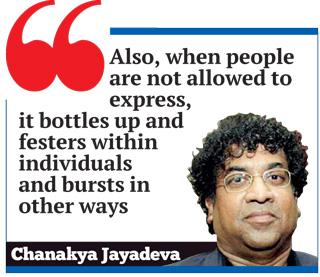 racial disharmony, those holding critical views about government agendas are also being ‘watched’ and ‘blocked’.
racial disharmony, those holding critical views about government agendas are also being ‘watched’ and ‘blocked’.
Sampath Samarakoon, media activist and Editor at Vikalpa – a website that promotes citizen journalism- said that policy makers who draft laws on social media have no idea about the Internet or the digital world in the first place. “Internet-based platforms cannot be regulated by introducing locally applicable laws. Therefore what policy makers should be doing is to improve social media literacy among people without enforcing laws and curtailing media freedom,” said Samarakoon.
“Without being literate how would users know about content, specific references to sex and gender matters and other sensitive areas?” he questioned adding “But users also need to be cautious about fake news and hate speech. So what is really needed is to counter hate speech and fake news without exerting their power and arresting people.”
When asked if self-regulation could be a better approach Samarakoon said that self-regulation can only happen if users have a certain amount of literacy. “During a survey conducted on social media usage we found that at least 90% of people in Sri Lanka do not have any idea about guidelines on social media platforms such as Facebook, Twitter and YouTube. Therefore, how can they self-regulate content in this case?” he queried.
Harassment, surveillance and intimidation has to stop
Sharing his thoughts, Dr. Paikiasothy Saravanamuttu, Executive Director at Centre for Policy Alternatives said that social media has been running riot as of late. “There has to be a certain amount of regulation, but the Government should do so according to international regulations and human rights considerations. Whatever laws that are being placed, they should be precise on what they intend to do and how they are going to bring about the laws,” opined Saravanamuttu. He further said that harassment, surveillance and intimidation of civil society and journalists has to stop.
Laws to control FoE should worry every citizen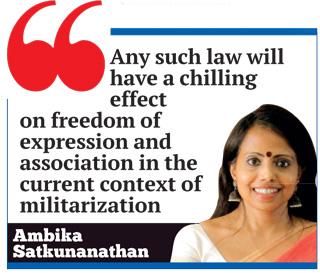
Human rights advocate Ambika Satkunanathan said that while people are yet to see the proposed draft law, any attempt by the state to enact laws to control freedom of expression (FoE) should worry every citizen, especially given Sri Lanka’s history of stifling dissent. “For example, in recent years we saw a woman wearing a dress with a ship steering wheel and writers being arrested under ICCPR Act, which illustrates how easily it can be misused. Any such law will have a chilling effect on freedom of expression and association in the current context of militarization, governance through ad-hoc executive structures and initiatives to increase surveillance,” said Sathkunanathan.
State should earn trust of citizenry first
According to attorney-at-law Gehan Gunatilleke, who also specialises in freedom of expression and countering violent extremism political discourse and public outrage are the most powerful ways to regulate social media. “Legal interventions are rarely the answer to the problems we face on social media. Take hate speech for instance. It has been around well before the arrival of social media, so merely focusing our attention on social media is not going to make hate speech disappear. Instead, public pressure and citizen initiatives (such as Sri Lanka’s Social 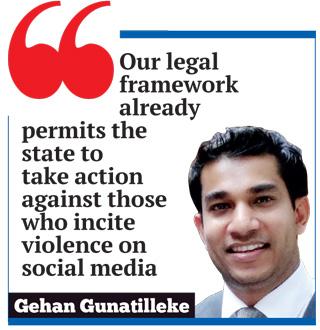 Media Declaration) should be relied on to incentivize social media platforms to improve their systems. The problem is that we focus a lot of attention on websites and social media platforms without understanding the deeper reasons for why hate speech and disinformation persist in the first place. In Sri Lanka, a lot of hate speech and disinformation targeting minorities persist – not because of poor media regulation – but because Governments tolerate it. The atrocious media behaviour with respect to Dr Shafi, and detained lawyer, Hejaaz Hizbullah are prime examples. By focusing on websites and social media platforms, we are ignoring the actual complicity of government actors.” said Gunatilleke.
Media Declaration) should be relied on to incentivize social media platforms to improve their systems. The problem is that we focus a lot of attention on websites and social media platforms without understanding the deeper reasons for why hate speech and disinformation persist in the first place. In Sri Lanka, a lot of hate speech and disinformation targeting minorities persist – not because of poor media regulation – but because Governments tolerate it. The atrocious media behaviour with respect to Dr Shafi, and detained lawyer, Hejaaz Hizbullah are prime examples. By focusing on websites and social media platforms, we are ignoring the actual complicity of government actors.” said Gunatilleke.
“In any case, social media users are already accountable for their expressions. Our legal framework already permits the state to take action against those who incite violence on social media,” he added.
Speaking on how FoE could be regulated in the existing media landscape, Gunatilleke pointed out that the state is answerable to the citizen. “So if the state proposes to regulate citizens’ rights, it has to first demonstrate its good faith and earn the trust of citizens. The citizens then entrust the state with regulation. In Sri Lanka, unfortunately, we cannot place our trust in the state when it comes to restrictions on freedom of expression. Too many Governments have repeatedly suppressed free speech for us to now welcome further regulation. It is not a case of asking citizens to use free speech responsibly; it is a case of asking Governments to exercise power responsibly first. Once Governments demonstrate a sense of proportion and objectivity, we can start talking about reasonable regulation,” added Gunatilleke.
Sri Lanka’s Supreme Court, in its recent determination on the Twentieth Amendment cited one of its landmark judgments on the freedom of expression: Joseph Perera v The Attorney General (1992). In that case, it was observed: ‘The freedom of speech and expression means the right to express one’s convictions and opinions freely by word of mouth, writing, printing, pictures, or any other mode…this freedom is ensured by the freedom of circulation.’ There is no doubt social media falls within the constitutionally protected realm of free speech in Sri Lanka. Therefore, only an Act of Parliament approved by a two-thirds majority can legitimately restrict social media in Sri Lanka.
He further said that self-regulation, particularly in contexts where governments have not acted responsibly in exercising regulatory power, is far more preferable.
“There are two types of regulation available to governments. One is the regulation of content, and the other is the regulation of market structures. On the one hand, we should never place too much trust in states to regulate the content of citizens’ expressions. The only type of restriction that should be permitted is the restriction of speech that incites violence. Too much regulatory power in this domain will only lead to the suppression of dissent and criticism. It is precisely what is at stake in Sri Lanka. On the other hand, there is a serious problem in terms of the market share and reach of some social media platforms, and governments do have a role to play in regulating markets. It should introduce measures to prevent monopolies, and incentivise competition, so that social media becomes a domain that cannot be controlled by single actors,” he continued.
When asked if country-specific Community Guidelines would be helpful for users and to filter hate speech and fake news he opined that it is crucial that social media platforms invest resources into understanding a particular country context, and have the flexibility to implement their Guidelines in a manner that is actually effective. “For example, criticism of a particular religious community in one context may not be as dangerous and inciteful as it might be in a different context. Content moderators need to be trained better and provided with contextual understanding to remove content that can be harmful in a given context. Of course, it won’t be easy, given the sheer volume of social media content. But it’s a challenge that has to be overcome through smart solutions and constant learning,” said Gunatilleke.